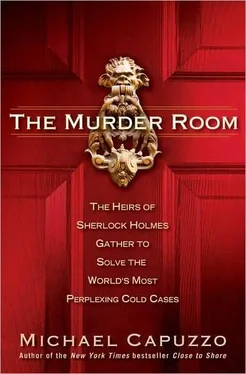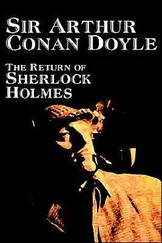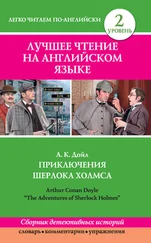“That’s certainly suspicious.”
“There was blood all over the bedroom, Scott’s blood. I won’t give up until I find out what happened to my son. I was calling to see if the Vidocq Society might help me.”
“I understand. It’s a murder, obviously. What do the police think?”
“It’s the Lubbock PD, and it started out as a missing persons case, but now they’re investigating it as a murder. But they haven’t arrested anybody, and the district attorney said we don’t have a case because there’s no body, no weapon. In Texas you can’t have a murder without a body. I’ve been on the DA’s case for a year.”
“So the case is only a year old,” Fleisher mused aloud, “and there’s no body.” He paused to take a breath. This was never easy. “I’m sorry to say this, Mr. Dunn, but this doesn’t sound like a Vidocq Society case.” He sensed the vacuum of quiet disappointment on the line.
“Number one, this case is just too fresh for us. Cases have to be cold for at least two years. You just haven’t given the police enough time to do their job. If we come in they’ll be saying, ‘Whoaah, what are you doing on our case?’ We provide advice and counsel to police departments when they ask for it. We don’t steal anybody’s thunder. We don’t harpoon cases.”
“I understand,” Dunn said evenly.
“Number two, you don’t even have a body. Technically, it’s still a missing person case. We see those all the time. Some people just disappear, they want to drop out. He could come back. He could be a suicide. We just don’t know.”
“My son didn’t commit suicide. He was murdered.”
“OK, you’re probably right. But number three, even if it’s a murder it’s almost impossible to get a murder conviction without a body. It’s one of the classic standards of homicide investigation in our legal system. You need the corpus delicti. And it doesn’t help that you’ve pissed off the district attorney, ultimately the only man who can seek justice for your son.
“I’m sorry to say we can’t help.”
Dunn didn’t pause: “Mr. Fleisher, could I just meet with you? Maybe someone in the organization might have some ideas how we could proceed, just some advice. We live right here in the area and I will meet you anywhere.”
“OK, then, why don’t you send me some materials and I’ll look them over.”
“I’m sorry, I can’t do that,” Dunn said firmly. “I’m going back to Texas next week to keep looking for my son, and I want my materials with me-it’s all I have left of Scott.” There was a long silence, and then he said, “Mr. Fleisher, I believe you are the only chance I have.”
Something clicked in that moment for Fleisher. “I knew then that Jim Dunn was a good man. He’d do anything to find his son.” Fleisher knew all about the difficult bonds of fathers and sons, the longings that survived death.
His father had taught him to keep his mind and heart open, to always be willing to listen to a good man. He often thought about how his father had learned that lesson himself, when Temple University wouldn’t let him in to take his final exam required to graduate from dental school during the Great Depression. He’d passed all the graduate school classes, but he was too poor to make his last tuition payment or even pay for his diploma. As the exam was being given, he went to see the university president, Charles E. Beury. Beury’s secretary said the president was going to a meeting and couldn’t see him. Herbert Fleisher said, “Tell him it’s a matter of life and death.” The president invited him in. Beury, a tall Princeton grad, class of 1903, looked at his watch and said, “You have five minutes, son. What’s the problem?”
Fleisher’s father began, with tears in his eyes, telling the president about his financial problems and that they would not let him take his dental final.
A half hour later, Beury looked at his watch and said, “You have five minutes left.”
When the time was up, the president took out a piece of paper and wrote a note to the dean of the dental school to let Herbert Fleisher take the test. But when he got there the test was over. The dental dean instead made him take an oral final exam, which was very tough. “My father passed and became an excellent dentist.” Years later Beury was quoted in the newspaper saying, “A university should teach not only the rudiments of education, but it should set standards whereby young men and women may learn to recognize a good man when they see one.”
Jim Dunn was a good man. I’m going to try to find a way to help him, Fleisher thought.
Fleisher spoke rapidly with the no-nonsense tone he used when he wasn’t cracking jokes.
“OK, Jim. We get hundreds of requests, and most people we can’t help. But we’ll try to give you some advice and guidance. I’ll call Frank Friel, who is the police chief in Bensalem, near you in Bucks County, and we’ll both meet with you at his office.” Dunn said he would come with his wife, Barbara. The meeting was set for eight the next morning.
Dunn was speechless. “Mr. Fleisher, I don’t know what to say.” “Frank was a legendary police captain with the city of Philadelphia,” Fleisher continued. “He’s a Vidocq Society Member and one of the most astute men I know on homicide cases. I don’t know if we’ll be able to help beyond this. But if anyone can give you guidance, it’s Frank.”
CHAPTER 31. THE SAGE OF SCOTLAND YARD
The night flight from London landed in Philadelphia in the rain. The thin man in coach was not pleased. “It’s ugly, I’m exhausted, I’m miserable, it’s not good,” Walter mumbled. “And I’m out of my last goddamn cigarette.” He was disgusted by the sallow faces in the gloomy concourse, and got in the taxi thinking, I’ve got to get away from stupid people. The other passengers gave the gaunt, stiff-backed gentleman with the shining aluminum attaché a wide berth. This pleased him. “It reduces the time I must spend with the dull and ignorant.” The last thing he needed was someone to start asking him who killed JonBenet Ramsey, or who Jack the Ripper really was.
Walter was physically spent. On the road he lived on cigarettes, Chardonnay, cheeseburgers, and sedatives for long flights. Sleeping little, he often fell ill during trips, and depended on the kindness of strangers-pathologists in London to prescribe medicine, a boy in Istanbul to follow the frail American around with a chair, kindly folks everywhere to help him find his way. He was always getting lost. To restore his self, he told the cabbie, he needed to find the essentials: cigarettes, diet soda, laxatives, and a drink.
“The cigarettes must be Kool Menthol Kings. The diet soda must be red. The laxative must work.” Then he’d collapse in his hotel bed.
The trip to Scotland Yard had nearly done him in. He had been woozy with lack of sleep when he lectured to three hundred of the brightest minds in the Home Office on murder. Walter had consulted with London ’s Metropolitan Police, also known as Scotland Yard, for years on major cases. He would later help them catch the serial killer of homosexuals who terrorized London, explaining that the slayer threw his victims out high windows because this variety of killer was enchanted by nasty sarcastic puns, in this case “Fairies can’t fly!”
At Scotland Yard, “they consider me a guru-the guru of all perversity,” he said with humor and no small pride-meaning sadism, Munchausen syndrome, Munchausen syndrome by proxy, and the other “isms” he seemed to grasp as if he’d created them. But the Brits were damned tired of hearing how smart the Americans were on the most difficult murder cases.
Looking out across the sea of faces, he saw the narrowed eyes of “the enemies of my ideas”-the Old Guard, old men trapped in the orthodox nineteenth-century procedural method of murder investigation. Walter was a heretic. The depth of the psychology of the murdering mind, its artistic, symbolic expressions in the positioning of the body just so, the hidden meaning of the knife in the chest (six inches long, the average penis length; look for a perp, like most sex criminals filling the prisons in seething rage, who couldn’t get it up). They were horrified by him. He was peddling “a cross between New Age folderol and witchcraft.” His challenge was to convince them his work was empirical, “not just bad gas from a good meal.”
Читать дальше












